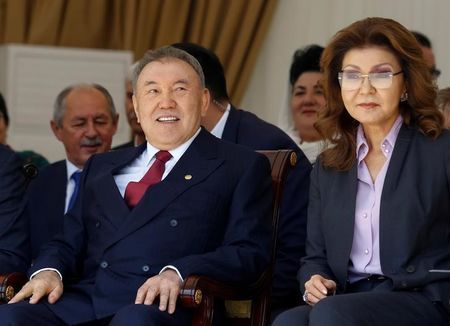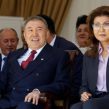
Nazarbayev Shakes up Government Amid Weak Economy and Worries of Insecurity
Publication: Eurasia Daily Monitor Volume: 13 Issue: 150
By:

Following a month of lull in August, when the parliament was in recess and the majority of cabinet ministers took a short break from meetings and press briefings, Kazakhstani President Nursultan Nazarbayev opened the fall’s joint session of the Mazhilis and the Senate (lower and upper chambers of parliament, respectively) with a forceful reminder of the challenges the country was facing. In his hour-long address to legislators, the head of state stressed that, unlike in previous years, the first priority of the government would be to combat terrorism and religious extremism. The state would take these steps via enhanced law enforcement and through the adoption of new antiterrorism legislation, he declared (Akorda.kz, Inform.kz, September 1).
In June 2016, Kazakhstan witnessed a series of coordinated attacks on National Security Committee (KNB) and police officials in the western city of Aktobe, close to the border with Russia. Twenty-five died (including 18 attackers) and 22 were wounded in the incident. The next month, a lone wolf fired shots at police patrols in the former capital of Almaty, killing eight people and wounding several others. The KNB and the Ministry of Interior moved into high gear and carried out antiterrorism operations across the country during August. Two extremist cells were successfully dismantled in the provinces of West Kazakhstan and Aktobe, leading to the arrest of 10 and 11 individuals, respectively (Tengrinews.kz, June 6; Forbes.kz, July 18; Newskaz.ru, August 31).
Additionally, a group of four extremists—three Kazakhstani nationals and their ringleader from neighboring Kyrgyzstan—were earlier identified by the security services in Almaty Oblast. The men had reportedly been planning to conduct unprecedented bomb attacks against unspecified civilian and military targets in the country. The now-former head of the KNB, Vladimir Zhumakanov, told the media, on August 29, that the four suspects were sympathizers of the prohibited Salafi movement, which preaches extreme religious conservatism and can have links to violent radicalism (Kursiv.kz, Kapital.kz, August 18; Inform.kz, August 29).
A subsequent press release by the KNB further stated that those above had intended to stage 9/11-styled attacks on a massive scale, namely by using a hijacked airplane from the regional airport of Taldykorgan. While no other information has been made public so far, it is clear that Kazakhstan is currently facing the hardest test of its domestic stability since 1991. In reaction to the growing threat of radical Islam, on September 8 Nazarbayev made a highly unanticipated decision to name Prime Minister Karim Massimov head of the KNB. Massimov has served as head of government since April 2014, after already leading the cabinet of ministers between 2007 and 2012. His predecessor at the KNB, Lieutenant-General Zhumakanov, was recently appointed chairman of the National Security Council, a purely consultative body within the presidential administration (Total.kz, September 13; RBC, September 8).
Massimov’s new job unambiguously reflects Nazarbayev’s personal trust in him at a time when Kazakhstan is struggling to cope with the rise of violent extremism amid the weak economy and unending speculation about the future presidential succession. Yet, the domestic socio-economic situation remains by far the number one priority, largely because Kazakhstan correlates insufficient or nonexistent economic growth with a growth in radicalism. The government expects a particularly modest 0.1 percent uptick in GDP this year. As long as the price of Brent crude oil, the international benchmark, stays at its current level of around $50 per barrel, the Kazakhstani authorities will undoubtedly have to wage active campaigns on two key fronts: saving the economy from collapse and precluding further radicalization of the country’s most vulnerable citizens (RIA Novosti, May 23; Matrica.kz, July 12).
The new prime minister is Massimov’s heretofore first deputy, 52-year-old Bakytzhan Sagintayev, who had previously served, since 2013, as regional development minister until this cabinet position was abrogated by the August 2014 administrative reforms. Albeit self-effacing and not much different in style from his former boss, Sagintayev is keen on reviving growth by all means and has already publicly warned the other cabinet members that they will have to “deliver” or resign. In a likely bid to show his personal attachment to cost-saving, the new head of government has gone so far as to ban all foreign travel by ministers until 2017, except if they are accompanying the president (Ktk.kz, September 9; Government.kz, September 13).
Aside from a few new appointments, Sagintayev’s cabinet differs little from that under Karim Massimov. Former Defense Minister Imangali Tasmagambetov is now the first deputy prime minister and has been succeeded by career military man Saken Zhasuzakov. Justice Minister Berik Imashev, who happens to be the father-in-law of Nazarbayev’s elder grandson, Nurali Aliyev, has become the chair of the Central Election Commission. His successor is the former deputy head of the presidential administration, Marat Beketayev. Meanwhile, the president’s elder daughter and Nurali’s mother, Dariga, relinquished her duties as deputy prime minister in charge of social issues and was appointed to the Senate, where she could potentially take the speaker’s seat, thus becoming first in line of succession to her 76-year-old father (Tengrinews.kz, Nur.kz, September 13–12).
Lastly, President Nazarbayev scrapped the Ministry of Civil Service, whose head, Talgat Donakov, has hence moved to the presidential administration. Moreover, the head of state created the Ministry of Religious Affairs, to be headed by Nurlan Yermekbayev, the former chair of the National Security Council and a fluent Mandarin Chinese–speaker (Akorda.kz, September 13). Together with a renewed focus on more efficient economic policy, the government seems genuinely interested in not only assuring internal security but also exerting control over various faiths, ultimately with an eye to clamping down on radical sects. In the long run, if the current structure of government holds, KNB chief Massimov, Prime Minister Sagintayev, some of his influential deputies like Tasmagambetov and, of course, Dariga Nazarbayeva could all play crucial roles in the opening of a post-Nazarbayev era.




